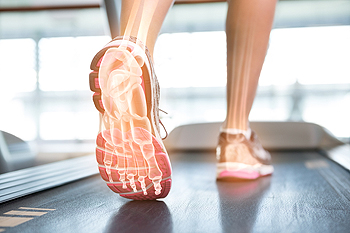
We use our feet for most of what we do in life and given that each foot is made up of 26 bones, developing various foot problems over our lifetimes is not surprising. One’s feet can get injured, inflamed, or malfunction in a multitude of ways. Wearing improper footwear, having a chronic disease like diabetes, and aging are the major contributors to foot problems. The most common symptom of foot problems is pain—in the ankles, toes, heels, or soles of the feet. Some conditions causing foot pain are discussed here. Athlete’s foot is a contagious fungal infection resulting in itchy, stinging, and burning feet and toes. A bunion is a bump on the side of the big toe causing the toe to bend inward towards the other toes. Corns are round circles of thickened skin on toes or soles of feet that develop to prevent blisters. Plantar Fasciitis is when the plantar fascia ligament running along the bottom of the foot becomes strained or sustains micro tears. Heel spurs are bony protrusions that grow from calcium deposits between the heel and arch of the foot and appear on the front of the heel. Hammertoes are when toes curve down rather than out. An ingrown toenail is when a toenail grows into the surrounding skin. A plantar wart is a wart on the bottom of the foot that arises from the human papillomavirus. Flat foot is when the arch of the foot collapses. Diabetic neuropathy is when there is damage to the nerves of the feet due to unregulated high blood sugar and one experiences a tingling feeling or loss of feeling in the foot. If you suffer from pain in any part of your foot, consult with a podiatrist for proper diagnosis and a customized treatment plan.
If you have any concerns about your feet, contact Jim Maxka, DPM from South Penn Foot & Ankle Associates. Our doctor can provide the care you need to keep you pain-free and on your feet.
Biomechanics in Podiatry
Podiatric biomechanics is a particular sector of specialty podiatry with licensed practitioners who are trained to diagnose and treat conditions affecting the foot, ankle and lower leg. Biomechanics deals with the forces that act against the body, causing an interference with the biological structures. It focuses on the movement of the ankle, the foot and the forces that interact with them.
A History of Biomechanics
- Biomechanics dates back to the BC era in Egypt where evidence of professional foot care has been recorded.
- In 1974, biomechanics gained a higher profile from the studies of Merton Root, who claimed that by changing or controlling the forces between the ankle and the foot, corrections or conditions could be implemented to gain strength and coordination in the area.
Modern technological improvements are based on past theories and therapeutic processes that provide a better understanding of podiatric concepts for biomechanics. Computers can provide accurate information about the forces and patterns of the feet and lower legs.
Understanding biomechanics of the feet can help improve and eliminate pain, stopping further stress to the foot.
If you have any questions please feel free to contact our office located in Hanover, PA . We offer the newest diagnostic and treatment technologies for all your foot and ankle needs.
